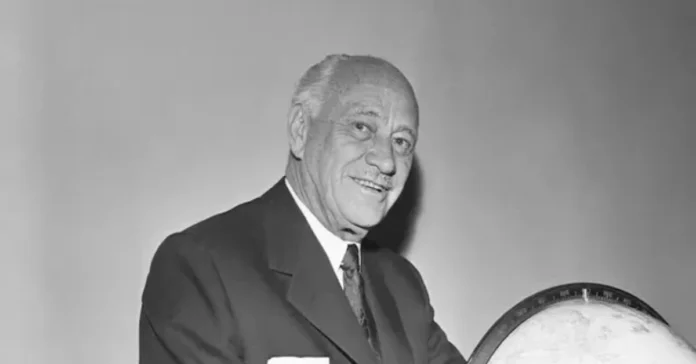Conrad Nicholson Hilton transformed the hospitality industry through vision, innovation, and perseverance. This American hotel magnate created one of the world’s most recognizable hotel chains through smart business decisions and a commitment to quality service. His journey from humble beginnings to global success shows how determination and business savvy can build an international empire.
Let’s explore how this hotel industry pioneer changed how we travel and stay around the world.
Early Life and Background
Conrad Hilton entered the world on December 25, 1887, in San Antonio, New Mexico Territory. Born to Augustus Halvorsen Hilton, a Norwegian immigrant, and Mary Genevieve Laufersweiler, who had German roots, Conrad grew up in a busy household. His childhood home doubled as a family store and small inn, giving him early exposure to customer service and business management.
Young Conrad showed entrepreneurial talent from an early age. He watched his father run their family store and learned valuable business lessons. His mother, a devout Catholic, instilled strong faith and values that guided his later business decisions and philanthropy. These early influences shaped his character and work ethic.
Conrad pursued education at several institutions, including the Goss Military Academy (now New Mexico Military Institute) and New Mexico School of Mines. His formal education, combined with practical business experience at his family’s store, gave him a solid foundation for his future career. After school, he briefly served in the military during World War I.
Before entering the hotel business, Conrad tried his hand at several ventures. At age 21, he took over his father’s general store, gaining hands-on management experience. These early business attempts taught him valuable lessons about customer service, inventory management, and financial planning – skills that proved essential for his hotel career.
Entry into the Hotel Business
Conrad Hilton’s hotel career began in 1919 when he purchased the Mobley Hotel in Cisco, Texas for $40,000. He didn’t originally plan to buy a hotel – he went to Cisco to purchase a bank. When that deal fell through, he noticed the busy Mobley Hotel and recognized an opportunity. The Texas oil boom created high demand for rooms, with workers often renting beds in eight-hour shifts.
The Mobley Hotel presented many challenges for the new hotelier. Rooms were constantly full, and Conrad had to manage rapid turnover with limited staff. He worked tirelessly, often making beds and cleaning rooms himself. These hands-on experiences taught him the basics of hotel operations from the ground up.
Conrad quickly developed a vision for improving his first property. He realized he could maximize profits by using space more efficiently. He converted unused areas into additional guest rooms and improved service quality. His concept of “minimax” – minimizing expenses while maximizing service – became a cornerstone of his business philosophy.
Success at the Mobley Hotel encouraged Conrad to expand. He purchased additional properties throughout Texas, including hotels in Fort Worth, Dallas, and Abilene. By 1925, he had established a pattern of buying, improving, and profitably operating hotels. His reputation as a savvy hotel operator grew throughout Texas, setting the stage for larger ambitions.
Building the Hilton Hotels Corporation
Conrad Hilton founded Hilton Hotels Corporation in 1919, marking the beginning of what would become a global hospitality empire. His systematic approach to hotel management set new standards in the industry. The first hotel to bear the Hilton name opened in Dallas, Texas in 1925 – the Dallas Hilton, a high-rise property that showcased his growing ambitions as a hospitality pioneer.
The Great Depression hit Hilton’s expanding business hard. By 1931, he had built a chain of eight hotels but faced bankruptcy during the economic crisis. Rather than giving up, Conrad displayed remarkable resilience. He worked with investors and creditors to maintain control of some properties while reorganizing his finances. This period taught him valuable lessons about surviving economic downturns.
After weathering the Depression, Conrad renewed his expansion strategy across America. He acquired prestigious properties like the Palmer House in Chicago and the Plaza Hotel in New York. Each acquisition strengthened the Hilton brand and expanded its geographic footprint. His hotel chain development accelerated after World War II, when Americans began traveling more.
In 1946, Hilton Hotels Corporation became the first hotel company listed on the New York Stock Exchange. This public offering provided capital for further expansion and established Hilton as a major corporate entity. Conrad’s business vision had transformed from managing individual properties to leading a publicly traded hotel corporation – a remarkable achievement for someone who started with a single Texas hotel.
Business Innovations and Philosophy
Conrad Hilton revolutionized hotel management with his “minimax” concept. This approach focused on maximizing space usage while minimizing wasted areas. He famously removed lobby space to add more guest rooms and revenue-generating facilities. Hotel managers previously treated lobbies as showplaces, but Conrad saw them as potential profit centers. This practical thinking changed industry standards.
Standardization became a hallmark of Hilton hotels under Conrad’s leadership. He created consistent experiences across properties through standardized room layouts, service protocols, and amenities. Guests knew what to expect at any Hilton worldwide – clean rooms, quality service, and specific amenities. This consistency built brand loyalty long before most companies understood branding concepts.
Customer service principles formed the core of Conrad’s business philosophy. He trained staff to treat every guest with respect and attention. One of his famous quotes, “Fill the earth with the light and warmth of hospitality,” became a guiding mission for his company. He believed hospitality meant making guests feel welcomed, valued, and comfortable.
Conrad developed an early vision for international expansion when most hotel operators focused only on local markets. He saw opportunities to bring American hotel standards to international locations and adapt to local cultures. This global mindset distinguished him from competitors and positioned Hilton for worldwide growth. His forward-thinking approach laid the groundwork for the modern global hospitality industry.
Personal Life and Relationships
Conrad Hilton married three times throughout his life. His most famous marriage was to Hungarian-American actress Zsa Zsa Gabor, which lasted from 1942 to 1947. Their relationship attracted significant media attention and placed Conrad in Hollywood social circles. Despite the glamour, the marriage ended in divorce, like his previous and subsequent marriages.
Family played an important role in Conrad’s life. He had three sons from his first marriage to Mary Barron – Conrad Nicholson Jr., William Barron, and Eric Michael. His son, Barron, eventually succeeded him as president of Hilton Hotels. Conrad maintained relationships with his children despite his demanding work schedule and complex personal life.
Balancing business demands with family responsibilities created ongoing challenges for Conrad. He traveled constantly for business, often missing family events and milestones. This work-life tension reflected his total commitment to building his hotel empire, sometimes at personal cost. Many successful entrepreneurs of his era faced similar struggles.
Conrad’s Catholic faith heavily influenced both his personal values and business practices. He attended Mass regularly and incorporated religious principles into his business ethics. His faith inspired his later philanthropy and shaped his company’s culture. Conrad believed business success carried responsibilities to help others, a conviction that grew stronger as he aged.
Global Expansion and Legacy
Conrad Hilton launched international expansion in 1949 with the Caribe Hilton in Puerto Rico. This property marked the beginning of Hilton’s global reach and demonstrated Conrad’s vision for worldwide hospitality. He followed this success by opening hotels in Europe, Asia, and the Middle East during the 1950s and 1960s.
The creation of Hilton International in 1948 accelerated global growth. This separate division focused exclusively on international properties, using strategic partnerships and management contracts. Conrad pioneered this approach to expansion, allowing faster growth without the capital requirements of ownership. This model changed how hotel chains expand globally.
During the Cold War, Conrad used hotels as tools of diplomacy. He opened properties in Istanbul, Cairo, and Berlin, believing American-style hotels could showcase Western values and lifestyle. The Conrad Hilton in Istanbul became a symbol of American presence in the strategic region. His hotels served as cultural ambassadors during tense political times.
Today, the Hilton brand maintains a massive global footprint with thousands of properties across more than 100 countries. This worldwide presence stems directly from Conrad’s early international vision. His company set hospitality industry standards that competitors still follow. Modern travelers benefit from the consistency, quality, and service principles Conrad established decades ago.
Philanthropy and the Conrad N. Hilton Foundation
Conrad established the Conrad N. Hilton Foundation in 1944 to channel his wealth toward humanitarian causes. This philanthropic organization reflected his belief that successful business leaders should help others. He wrote in his will that the foundation should “relieve the suffering, the distressed, and the destitute” – a mission it continues today.
The foundation focuses on several key areas, including safe water access, ending chronic homelessness, preventing substance abuse, and supporting Catholic sisters. Conrad directed most of his fortune to charity, leaving approximately $1.2 billion to the foundation upon his death in 1979. This massive endowment made it one of America’s largest philanthropic organizations.
The Conrad N. Hilton Humanitarian Prize, established in 1996, awards $2.5 million annually to organizations making extraordinary contributions to alleviating human suffering. As the world’s largest humanitarian award, it highlights Conrad’s commitment to recognizing those who help others. Past recipients include Doctors Without Borders and METAdrasi.
Conrad’s philanthropic legacy extends to hospitality education through university programs and scholarships. The foundation supports hospitality management schools worldwide, training future hotel industry leaders. This educational focus ensures Conrad’s hospitality knowledge continues to benefit new generations. His charitable giving created lasting positive impacts well beyond his lifetime.
Final Years and Lasting Impact
In his later years, Conrad reflected on his remarkable journey in his 1957 autobiography “Be My Guest.” This book shared his business wisdom and personal philosophy, becoming required reading for hospitality students. He wrote candidly about successes and failures, offering valuable insights for aspiring entrepreneurs. The book revealed the thinking behind his business decisions.
Conrad Hilton died on January 3, 1979, at age 91 in Santa Monica, California. He left the bulk of his estate to his foundation rather than family members. This decision surprised many but reflected his deep commitment to philanthropy. His son Barron, contested the will but eventually settled, continuing leadership of Hilton Hotels while honoring his father’s charitable wishes.
Conrad’s business wisdom lives on through his famous quotes and principles. He advised, “Success seems to be connected with action. Successful people keep moving.” Another favorite saying was, “Achievement seems to be connected with action. Successful men and women keep moving.” These practical insights continue to inspire business leaders today.
After Conrad’s leadership ended, Hilton Hotels evolved through various ownership changes while maintaining its core values. The company expanded into new market segments with brands like DoubleTree, Hampton Inn, and Embassy Suites. Despite corporate changes, Conrad’s customer service emphasis and quality standards remain central to the company’s identity.









